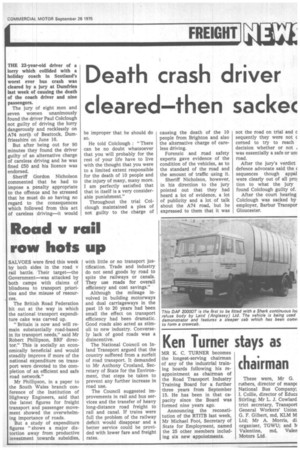Road v rail Naomi hots up
Page 19

If you've noticed an error in this article please click here to report it so we can fix it.
SALVOES Were fired this week by both sides in the road v rail battle. Their target—the Government—was attacked by both camp S with claims of blindness to transport priorities and the misuse of resources.
The Britis Road Federation hit out at he way in which the national transport expenditure cake w s carved up.
"Britain i now and will remain subst ntially road-based in its transp rt needs," said Mr Robert Phil ipson, BRF director." This i socially an economically btficial and would steadily imp ove if more of the national expenditure on transport were devoted to the completion of an efficient and safe road network."
Mr Philli son, in a paper to the South Wales branch conference of the Institution of Highway Engineers, said that the latest igures for freight transport a d passenger movement showed the overwhelming importarice of roads.
But a st4dy of expenditure figures "shows a major distortion away from productive investment towards subsidies, with little or no transport justification. Trade and industry do not send goods by road to spite the railways or canals. They use roads for overall efficiency and cost savings."
Although the mileage involved in building motorways and dual carriageways in the past 15 to 20 years had been small the effect on transport efficiency had been dramatic. Good roads also acted as stimuli to new industry. Conversely lack of good roads was a disincentive.
The National Council on Inland Transport argued that the country suffered from a surfeit of road transport. It demanded to Mr Anthony Crosland, Secretary of State for the Environment, that steps be taken to prevent any further increase in road use.
The Council suggested improvements in rail and bus services and the transfer of heavy long-distance road freight to rail and canal. If trains were full the problem of the railway deficit would disappear and a better service could be provided with lower fare and freight rates.




































































































